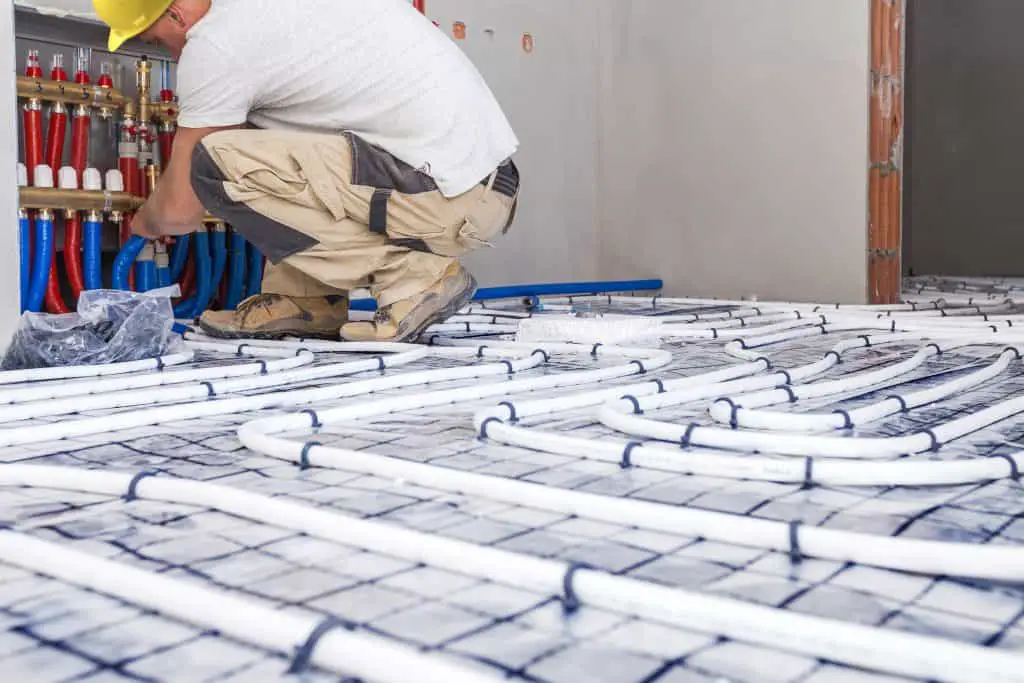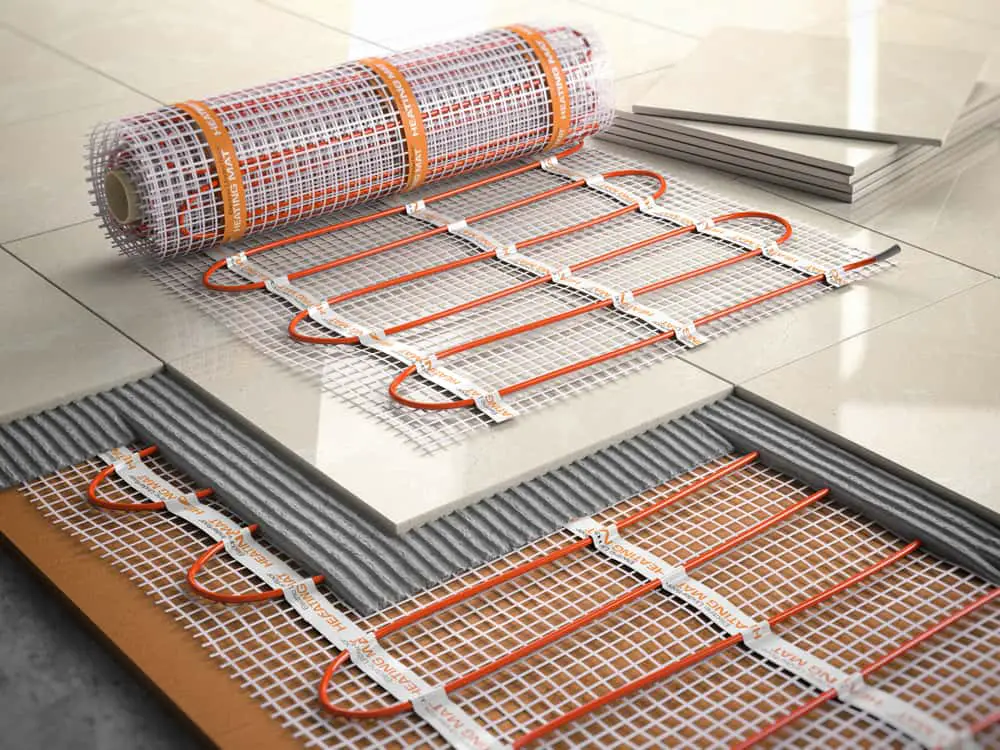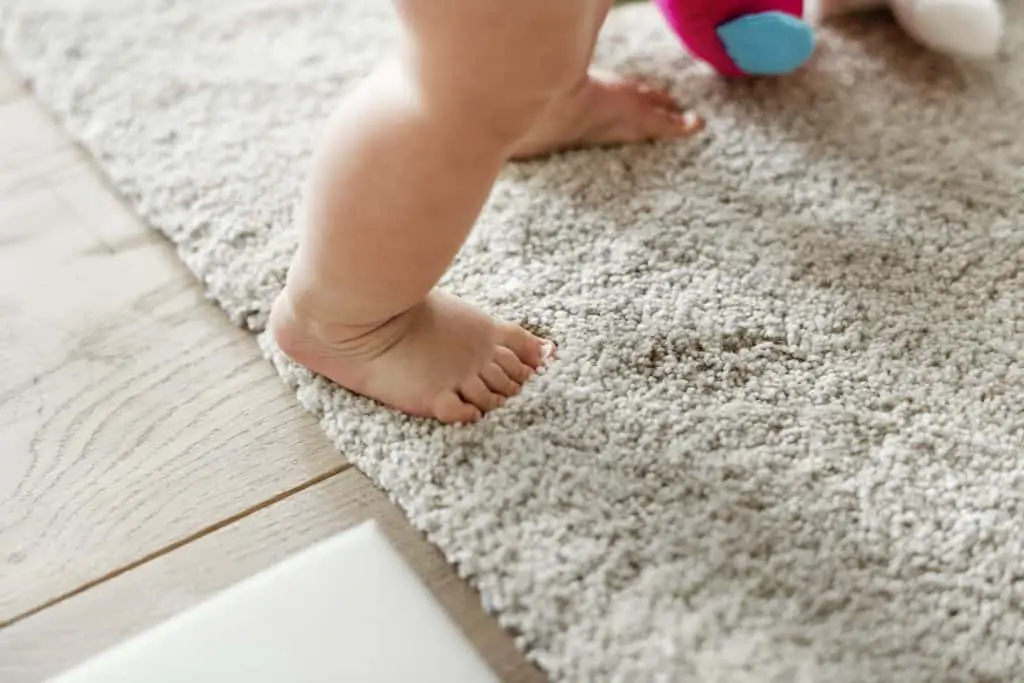A lot can go wrong with underfloor heating systems if the requirements for installation are not met. Before installing an underfloor heating system, the house owner should be aware of the various faults that can occur in these systems. This is to enable them to avoid various acts than can make them susceptible to faults and what to do when they occur.
Underfloor heating systems rarely undergo faults during their service life. Problems can arise from poor design or installation of the system or the failure of components. These faults range from leakages in the pipes, trapped air bubbles, short circuits, actuator, and flow valve faults.
In some situations, these faults can be very complicated and can cost as much as installing a new underfloor system. It is of good practice to ensure only certified professionals install these systems to prevent unwarranted partial or total breakdown of the system.

What can go wrong with underfloor heating?
Both types of underfloor heating systems have their generic faults. These faults can range from very minute to very costly and complicated ones. Some faults cut across both types of underfloor heating.
What can go wrong with water underfloor heating?
The faults that occur in water underfloor heating are usually very complicated and quite expensive to repair. This is because the floor(screed) has to be disassembled to access the origin of the faults. After locating the fault and making the necessary repairs, the floor would need to be reconstructed leading to further expenses. They include the following:
- Pipe damage: This is usually caused as a result of poor workmanship. On installing the pipes, proper inspection should be done to see if there are leaks in the pipes. This is done by allowing water to run through the pipes before installing the screed. Also, a seal ring should be installed for every pair of pipes joined together.
- Pressure unit damage: Water-based systems rely heavily on the pressure created by the pump. These units ensure that the water is constantly flowing and that the pressure throughout the system is constant. The standard pressure reading for these systems is usually between 1.5 and 2 bar on the flow valves.
- Heating unit age: The heating source for these systems tend to undergo wear and tear as they age. This is a result of numerous cycles of heating and cooling, the movement of water over the heating elements. Although modern-day heat sources now have a longer service life.
- Air Bubbles: Bubbles can cause a lot of problems when they are stuck in the system. The chances that there would be cold spots throughout your home if there are bubbles in the pipes. Bubbles can also damage the pump you have in your system. These are bubbles are removed by a process known as bleeding, which involves flushing the pipes with water. You may need to call a professional if you are not sure of the process.

What are the things that can go wrong with electric underfloor heating?
Electric systems are often retrofitted in your home because of the ease with which they can be installed. Due to this certain oversights can occur when installing them. Also, DIY installations are damaged by simple mistakes made by people not entirely sure about what needs to be done. It is often advised that only certified professionals should handle these installations if you are not sure of the process.
- Short circuits: This can occur as a result of wrong or improper connections within the electric underfloor heating system. This phenomenon could lead to a partial or total breakdown of the system. In worse-case scenarios, certain components of the system would have to be replaced.
- Water damage: Water and electricity do not always go hand in hand. It would be best to avoid water spills, especially in low-profile systems. In an event of a water spill, it is best to switch off the entire system from the mains before cleaning. After cleaning, switch on the heating system and inspect for cold spots. Cold spots across the floor would imply the heating cells have become damaged.

Faults that occur across both types of Underfloor Heating
- Thermal Blocking: Fixed or heavy furniture should not be placed directly on the underfloor heating system. This is to prevent thermal blocking which could compromise the integrity of the floor. Also wrong floor coverings could result in thermal blocking. In extreme cases, could lead to a fire outbreak.
- Component Failure: Certain components could just fail without prior notice or due to them being overworked. Some of these components include thermostats, actuators, and flow valves. A bad thermostat for instance would mean an irregular floor temperature since it can no longer regulate it.
- Screed Depth: This leads to uneven distribution of heat across the floor since the heating elements are not well buried into the screed.
- Insulation: Inadequate insulation in underfloor heating systems, would only lead to inefficiency of the system. This is because the heat generated would seep below the ground, and cause the system to struggle to heat up.
- Cold weather: A big reason that the underfloor heating in your home can become ineffective is because of a rapid temperature drop. Many homeowners that have been enjoying only moderate usage of their underfloor heating experience a loss of efficiency when the winter becomes too cold. This leads to the underfloor heating feeling like it is no longer effective when it just needs several more hours to work.
Why is underfloor heating a good option despite these dangers?
Underfloor heating remains the best means of heating homes. This is because the faults stated above rarely occur, and when they do occur, are usually down to poor installation. A well-designed underfloor heating system, installed by a professional would last for a long time without hitches.
Further, the benefits of having a home constantly being heated with underfloor heating mean that you and your family will not have to stress about allergies, mold, or mites. The benefits of having a complete underfloor heating system would greatly outweigh any possible damage that can be done to the system.
Also, underfloor heating systems have very low running costs. This is one of the biggest benefits of an underfloor heating system, as very few heating systems can compare. This allows people to comfortably and easily enjoy having the system heating their homes at all times while saving the money that would normally be going to power an inefficient HVAC system.

Conclusion – What can go wrong with Underfloor Heating?
While several things can go wrong with underfloor heating, these are rare and will usually be easy to fix if caught early. Once installed, the system should be properly tested to erase any form of doubt about its functionality, once the system is fully operational.
Water underfloor heating systems are usually quite expensive to repair when a fault occurs, and as such much attention should be paid to them when they are being installed. Electric underfloor heating systems are not as complicated or expensive to repair when faults occur.
The table below shows a summary of the potential list of problems that could occur with underfloor heating systems.
| Water Underfloor Heating | Electric Underfloor Heating | Both |
| Air Bubbles in Pipes | Short Circuits in the connections | Thermal Blocking |
| Pipe Leakages | Water Spillage | Inadequate screed Depth |
| Low Pressure in Pipes | Inadequate insulation | |
| Components Failure(Actuators, Flow Valves, thermostats) | ||
| Wear and tear caused by aging |
Once these systems undergo these faults, and you do not know how to handle the situation, seek the help of a certified professional to prevent worsening the situation. Getting the best heating system for your home does not mean that you have a system that never fails, instead, you have a system that rarely fails!
Take a look at this article’s twin for more information, which shows you how you can check your underfloor heating is working correctly.

Lots more Underfloor Heating Information Here
- What Depth is Required for Underfloor Heating?
- Turning on Underfloor Heating for the First Time – How Long to Wait?
- Can you lay Vinyl flooring over underfloor heating?
- Do Tiles Crack With Underfloor Heating?
- Can You Heat a Whole House With Underfloor Heating?
- Can You Have Underfloor Heating Upstairs?
- Will Underfloor Heating Raise My Floor? – Underfloor Heating Layers Explained
- Can I put furniture on top of underfloor heating?
- How Do I Know If My Underfloor Heating is Leaking?
- Can You Combine Underfloor Heating With a Ground Source Heat Pump?
- Is Underfloor Heating Safe?
- Does Underfloor Heating Add Value to a Property?
- Can you have Wooden Floors with Underfloor Heating?
- Can Underfloor Heating Cause a Fire?
- What temperature should Underfloor Heating be set at?
- Can I Put a Rug Over Underfloor Heating?
- How Long Does it Take for Underfloor Heating to Warm Up?
- Why is my Underfloor Heating Noisy?
- Why is my Underfloor Heating Patchy?
- How do I know if My Underfloor Heating is Working? – Common Problems & Fixes
- What can go wrong with underfloor heating?
- Can you Combine Underfloor Heating with an Air Source Heat Pump?
- Do you keep underfloor heating on all the time?
- Does Underfloor Heating work with Smart Thermostats?
- Kitchen Underfloor Heating – Should Underfloor Heating go Under Kitchen Units?
- How much energy does Underfloor Heating use?
- Underfloor Heating in Summer and Winter
- Lifespan of Underfloor Heating
